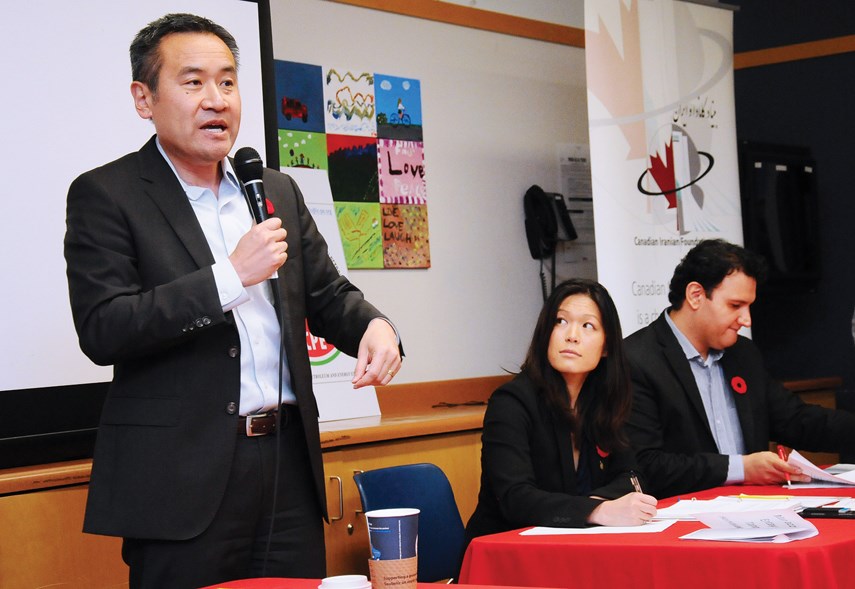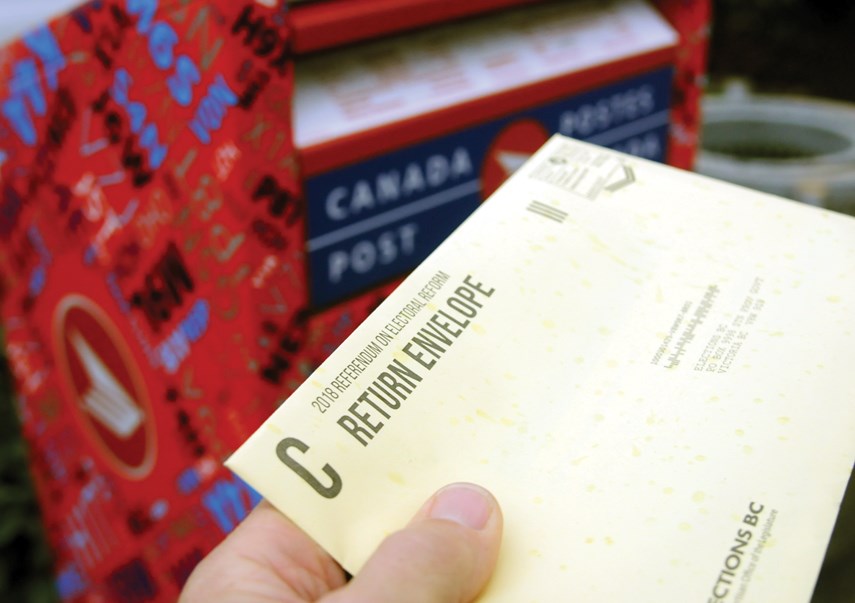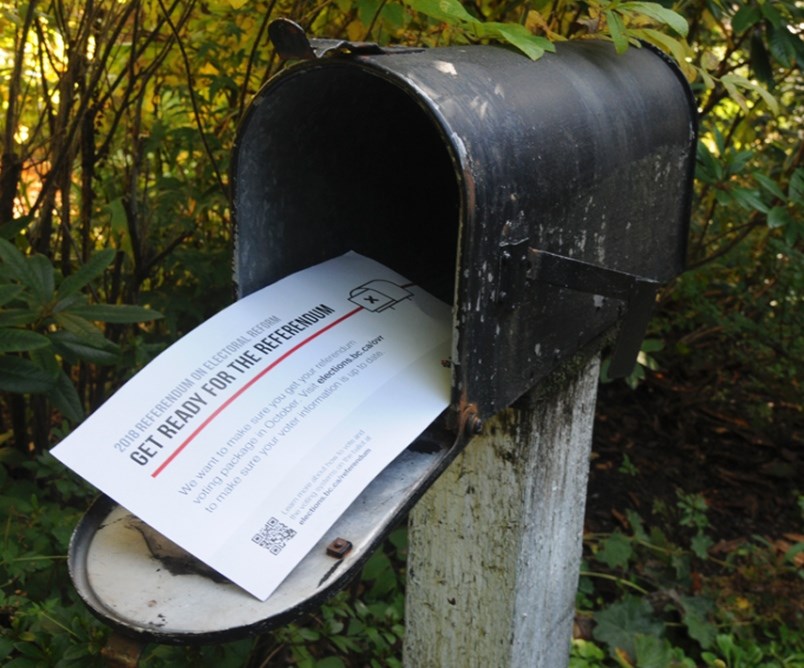North Vancouver-Lonsdale MLA Bowinn Ma wants British Columbia to enter the 21st century and embrace proportional representation, while her West Vancouver-Capilano counterpart Ralph Sultan doesn’t like the “highly partisan” referendum process on electoral reform.
Starting this week, British Columbians are sending in mail-in ballots in a referendum on whether to change how they elect their provincial government, and while the rhetoric is heightened on both the yes and no sides, the three new electoral systems are “made-in-B.C.” compromises that combine proportional representation with plurality and maintain local representation.
There are “different visions of democracy” behind those who support first past the post and those who support a proportional representation system, said UBC political science professor Maxwell Cameron.
“People who like the current system tend to think democracy is best served when we have decisive elections that lead to a government taking office with a majority and governing as it must to fulfill its mandate – for a period of time until we don’t like what they’ve done and we have a chance to throw them out,” Cameron explained. But many people are troubled by this “winner take all system,” he added, because if the party they voted for doesn’t win, their votes are “wasted.”
MLA Ralph Sultan favours first past the post
BC Liberal MLA Sultan called the referendum process a “stunning contrast” to the citizens’ assembly, a non-political process created by former premier Gordon Campbell to look at electoral reform in 2009, which he said politicians were forbidden from participating in.
“This time round we have the exact opposite – a highly partisan, very politicized, lots of things you want to raise your eyebrows over going on,” Sultan said, adding that people aren’t well-informed about this referendum. “This whole thing is galloping forward at break-neck speed and it’s a very important issue and there should be thoughtful consideration.”
Most OECD (Organisation for Economic Co-operation and Development) member countries use PR, Sultan said, making Canada one of the “outliers,” but with so many examples, it shows the strengths and weaknesses of the system.
Sultan said under a PR system, voters would not know who their representative was and local representation would be lost since the local vote would need to be topped up by the popular vote.
“At the moment, there’s no question who people in Edgemont Village or Dundarave should take their complaints to,” he said. “They chose me and I’m their guy and I live amongst them.”
He also prefers a system where differences are worked out before the election and candidates coalesce under one party, rather than in a PR system where there are MLAs from many parties and after the election, they form coalitions.
“I think the present system with all of its warts and callouses - it’s not perfect - produces better government, that’s my conviction, as opposed to governments that are in continual renegotiation,” Sultan said.
MLA Bowinn Ma prefers proportional representation
First past the post works relatively well when there are two parties, said Ma, but it starts to break down when there are more than two, and parties govern with less than 50 per cent of the votes.
This creates a “false majority,” she explained “where a legislature or parliament appears to have an overwhelming mandate for the work that they’re doing but in fact they’re supported by less than 50 per cent of voters that voted in the last election.”

Statistics of the last seven provincial elections show that, in the four North Shore ridings, 56 per cent of all the votes cast went to the BC Liberals, 26 per cent to the BC NDP and 11 per cent to the Greens, and yet, of the 28 races, the Liberals won 26 and BC NDP won two.
This sends a message that the North Shore is “overwhelmingly” BC Liberal, and whatever they do will be overwhelmingly accepted by the people on the North Shore, Ma explained.
“The reality is thousands and thousands and thousands of people on the North Shore elect for a person who is not BC Liberal,” she added.
In November 2017, the attorney general launched a public engagement process on electoral reform, soliciting about 92,000 questionnaires from the public. This resulted in the current referendum.
Three PR systems on ballot
Three types of PR are being presented as options based on the feedback: dual member proportional, mixed member proportional and rural-urban proportional.
The ballot will have two parts, first asking voters if they prefer proportional representation or first past the post, and then asking them to choose which of the three PR systems they prefer, either one, none or to rank them.
The province gave half a million dollars to both the yes and no campaigns, which have launched websites, nobcprorep.ca and voteprbc.ca, with restrictions on further fundraising.

Cameron pointed to Sweden and Germany as examples where PR has created long-term stability and collaboration. Except for the most recent election, Sweden has voted in the social democrats again and again, and they’ve governed in coalitions.
“Because the system is proportional, what tends to happen is you get these fairly stable centrist or centre-left coalitions, they tend to dominate politics over a long period of time,” Cameron said, adding “that stability is part of what allows these countries to actually do things like build robust welfare states or to shift their economy away from fossil fuels.”
Instead, in Canada, there is “an appearance of stable majority government, but in fact these majority governments are often very unstable.” With a complete turnover of government, situations like in Ontario arise where recently elected Premier Doug Ford is reversing the previous government’s policies on issues like school curriculum and climate change.
“We are hardly on the level of stability – Europeans look at us and they think these people can’t get their act together,” Cameron said.
Those opposing PR often point to “canards” like Italy or Israel. The PR system in the latter has a low threshold for parties to attain seats and the entire country, with a population of 8.5 million, is one electoral district.
That is not the system being proposed here in B.C., Cameron pointed out; rather, the three PR systems proposed in the referendum combine a plurality-based system supplemented with proportionality with a threshold of five per cent – that means parties need to get five per cent provincially before they get any seats.
All three systems are compromises and not a sharp turn one way or the other, Cameron said, “intended to find the best of both worlds.” Under PR, he added, no unelected MLAs would be sent to the legislature.
‘No’ campaigners point to problems in Europe
Suzanne Anton, who is part of the official “no” campaign, along with Bill Tieleman and Bob Plecas, said she opposes proportional representation because it’s a “fundamental change” in how people vote. In a first-past-the-post system, candidates are assessed for their character, leadership qualities, reliability, their work in the community and their political party affiliation.
“You look at all those factors, and, at the end of the day, you will choose a person to be your representative,” Anton said. “And this happens 87 times around British Columbia – the community chooses a person to represent them. We do not vote for political parties.”
The fundamental change with proportional representation is that the political party vote becomes the most important because that is what determines representation in Victoria.
While PR proponents say their system is more fair, Anton said their argument ends there, because the result is not necessarily better, pointing to Scandinavian and other European countries that have seen the rise of right-wing racist parties.
But Ma argues that voter turnout goes down when people feel their votes are wasted and they start to feel disengaged from politics, something she feels is “dangerous for democracy.”
The current power-sharing agreement between the BC NDP and the Greens is a “unique scenario,” Ma said. “A minority government and two parties that are forced to work together, (…) in order to get things done. It’s a seismic shift in the way that we work - and imagine an entire legislature where your success is defined not by your ability to put the other party down, but by your ability to compromise and work with them.”
The results from electoral reform are often “more muted” than has been predicted by both the pro and con side in this debate, Cameron said.
“The great benefits that we anticipate frequently don’t materialize,” he said. “Likewise, the terrible scourge that is predicted by the catastrophizing on the no side is unlikely to occur as well.”
Opponents to proportional representation will point out that both the Swedish and German systems are experiencing challenges, but Cameron said this is not because of PR, rather Europe has been affected by the largest mass migration since the Second World War.
Cameron thinks, if proportional representation is chosen, people will learn to appreciate it as a system.
“The most likely thing is people will discover, oh, this actually does seem pretty intuitive, it makes a lot of sense, parties will start to adapt a little bit in probably ways that most of us would approve of,” Cameron said.
While Sultan prefers the current system, he wants people to get out and vote, no matter the outcome.
“If proportional representation comes in, it’s not the end of the world, but it certainly would be a different world,” he said. “Frankly, folks, I prefer the world we have and as we know it, and it has worked very well, but you have to make up your own mind.”
Referendum voting packages must be returned by Nov. 30.
Voters can register or update their voter information online at elections.bc.ca/ovr, or by calling 1-800-661-8683, Monday to Friday, 8:30 a.m. to 4:30 p.m.



